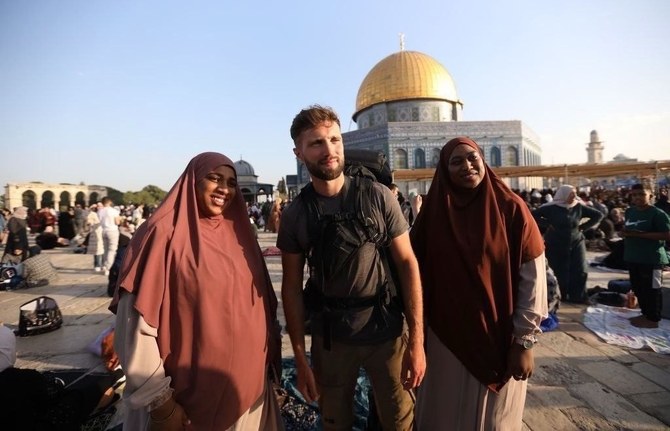RAMALLAH: A Muslim man who walked from his native France to Jerusalem has spoken of the warm welcome he received from Palestinians when he joined them for prayers at Al-Aqsa Mosque.
Neil Dauxois, 26, the son of an Algerian mother and French father, walked 3,900 kilometers from his home in the city of Lyon. His grueling journey took 10 months, during which he passed through Italy, Slovenia, Croatia, Bosnia and Herzegovina, Montenegro, Albania, Greece, Turkiye, Cyprus and Jordan.
After reaching Jerusalem he prayed with thousands of Palestinians at Al-Aqsa, Islam’s third-holiest site, last weekend on the last Friday of Ramadan, and again on Monday which was Lailat Al-Qadr. Also known as the “Night of Power,” this is the holiest evening of the year for Muslims, on which they celebrate the night on which the Qur’an was sent from Heaven to the world.
“Sometimes it was overwhelmingly good and sometimes challenging,” Dauxois told Turkey’s Anadolu news agency shortly after arriving at Al-Aqsa, as he described his journey.
He was welcomed at the mosque by hundreds of Palestinians who enthusiastically greeted him and took photographs with him that they shared on social media.
“I was astonished when I got here,” Dauxois said. “People were hugging me and kissing me. They welcomed me with sincere hospitality. I am delighted to be here and I cannot describe my feelings.”
He said his aim had been to reach the mosque and perform itikaf there during Ramadan. Itikaf is the Islamic practice of remaining in relative seclusion in a mosque or other place during the last 10 days of Ramadan with the intention of solely focusing on worship.
When he arrived at Al-Aqsa, Dauxois was carrying a large black backpack with the words “France to Jerusalem on foot” written on it in Arabic and English.
“It is amazing to see how this young man came from France to Al-Aqsa on foot,” said a worshipper at the mosque as he stood alongside the Frenchman.
Dauxois admitted that cold weather had made it difficult to continue walking through some regions, but said his journey had been “an extraordinary adventure full of humanity and hope.”
He added: “I could not express one-tenth of all I felt, and on my way I met many people of different religions who opened their doors to me. Without the help of these people, my journey would have been impossible.
“When I was in Turkiye, people were very kind and hospitable. If it weren’t for their help, I would have given up.”
Many of the Palestinians who greeted him invited him to stay with them in their homes in Jerusalem or the West Bank.
Sheikh Ekrima Sabri, the former grand mufti of Jerusalem, told Arab News that the Frenchman’s journey to Al-Aqsa should inspire Muslims worldwide to visit the mosque and pray there throughout the year.
“Al-Aqsa is not for the people of Palestine alone but for all the people of the world, just like the Grand Mosque in Makkah and the Prophet’s Mosque in Madinah,” said Sabri.
“We encourage Muslims from all over the world to visit Al-Aqsa Mosque at all times of the year, especially during the month of Ramadan.”
Dauxois acknowledged that his freedom to attend the mosque was a privilege denied to many Palestinians, as a result of Israeli restrictions, and offered them his support.
“I know the situation here (in Jerusalem and Palestine),” he said. “I have many Palestinian friends who cannot visit this place.”
His next goal, he added, is “to go for Hajj to Makkah in a month and a half.” He said that people in Saudi Arabia “are also following me; I would love to receive their help on my next journey.”



























